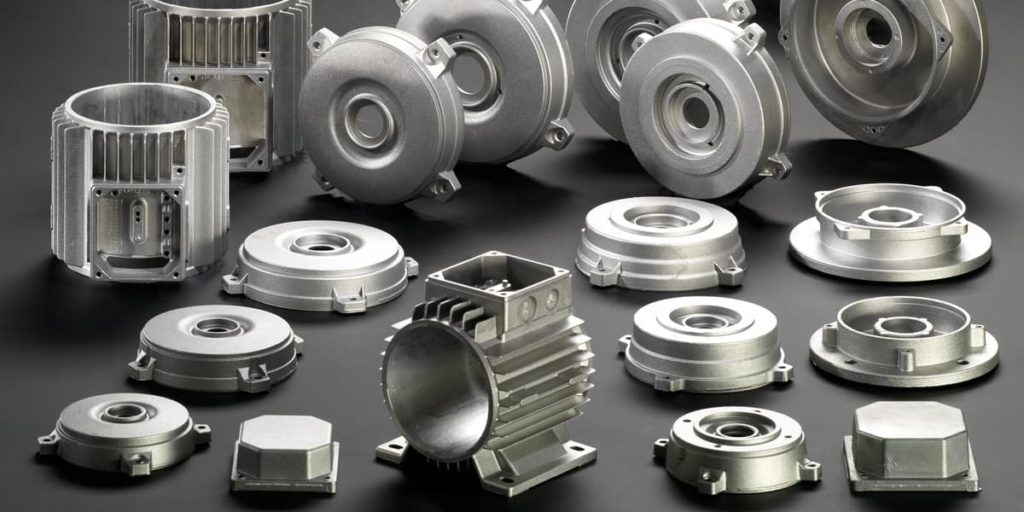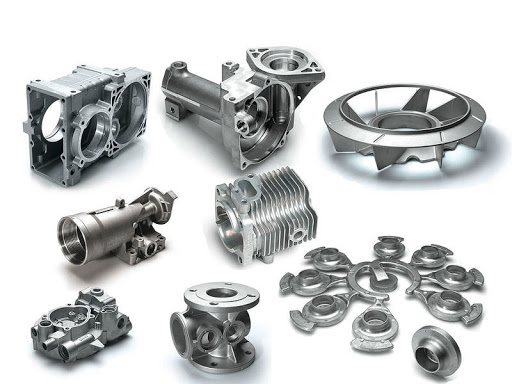How Metal Castings support cost-effective product designs
Wiki Article
The Importance of Aluminum Foundry in Advancing Industrial Manufacturing Techniques
The Aluminum Foundry plays an essential role in the evolution of commercial manufacturing strategies. Its light-weight residential or commercial properties and versatility make Aluminum a perfect choice for various applications. Advanced casting approaches, including die casting and 3D printing, enable detailed styles and mass manufacturing. As the sector moves in the direction of automation and sustainability, concerns occur regarding the future trajectory of Aluminum foundries and their influence on producing performance. What obstacles and technologies lie ahead?The Role of Aluminum in Modern Manufacturing
Aluminum plays a pivotal duty in modern manufacturing because of its special residential or commercial properties and flexibility. As a light-weight metal, it significantly minimizes the general weight of products, improving gas performance in transportation and aerospace markets. Its exceptional deterioration resistance warranties durability and integrity, making it ideal for various applications, from vehicle elements to developing products. Aluminum's pliability enables it to be conveniently shaped right into complicated styles, facilitating cutting-edge item advancement. Its conductivity makes it suitable for electric applications, adding to improvements in electronics and eco-friendly power technologies. The adaptability of Aluminum likewise includes its recyclability, which adds to sustainable production methods. As industries remain to focus on efficiency and ecological duty, Aluminum stays a crucial material, promoting technology and improving production procedures throughout multiple sectors. Its duty is not simply useful; it is foundational to the development of contemporary industrial techniques.Trick Advantages of Aluminum Spreading
The advantages of Aluminum casting are considerable, contributing to its popularity in different commercial applications. One key benefit is the lightweight nature of aluminum, which reduces transportation costs and boosts fuel effectiveness in automotive and aerospace industries. Additionally, light weight aluminum's exceptional deterioration resistance extends the life expectancy of actors components, making them excellent for marine and exterior settings.Furthermore, Aluminum casting permits complicated geometries and intricate designs, giving suppliers with greater versatility in item advancement - Wisconsin Aluminum Foundry. The product likewise displays great thermal and electrical conductivity, making it suitable for a series of electronic applications
Another advantage is the fast solidification procedure, which results in finer microstructures and boosted mechanical homes. Aluminum can be recycled repeatedly without losing its integral qualities, promoting sustainability in manufacturing methods. These advantages highlight Aluminum casting's pivotal role in advancing commercial manufacturing methods while meeting diverse design needs.
Ingenious Casting Strategies and Technologies
Many innovative casting techniques and modern technologies have actually arised to enhance the effectiveness and quality of Aluminum production. Among these, pass away casting stands out as a technique that permits high-volume manufacturing of intricate forms with exceptional dimensional precision. This technique utilizes high stress to infuse liquified Aluminum right into a mold, resulting in smooth surfaces and reduced need for machining.An additional notable development is the use of 3D printing for molds, which allows rapid prototyping and reduces lead times significantly. This innovation allows for detailed designs that traditional techniques may struggle to attain.
In addition, investment spreading continues to progress, making use of innovative materials and procedures to create accuracy parts. The fostering of computer system simulations in the casting procedure has actually additionally enhanced outcomes by optimizing and anticipating prospective problems mold styles. With each other, these innovations are changing Aluminum factories, leading the way for extra effective production and premium item top quality in various sectors.
Ecological Impact and Sustainability in Aluminum Foundries
As sectors significantly focus on sustainability, the environmental influence of Aluminum factories has come under scrutiny. These centers are substantial factors to greenhouse gas emissions and energy intake, largely as a result of the energy-intensive processes associated with melting and spreading light weight aluminum. The removal of bauxite, the primary ore, further intensifies environmental issues, leading to environment damage and air pollution.In response to these difficulties, several Aluminum factories are embracing extra lasting techniques (Wisconsin Aluminum Foundry). Technologies such as reusing scrap Aluminum greatly reduce energy use and exhausts, as reusing calls for just a portion of the power required for primary manufacturing. Furthermore, the combination of eco-friendly energy resources, such as solar and wind power, is getting grip in foundries aiming to lower their carbon footprint
Moreover, improvements in innovations that minimize waste and enhance source performance are coming to be crucial for the future of the Aluminum market. These initiatives highlight the change towards a much more ecologically responsible and sustainable approach in Aluminum foundries.
Applications of Aluminum Spreading Throughout Industries
Aluminum spreading locates widespread application throughout varied markets, owing to its positive residential or commercial properties such as lightweight, rust resistance, and outstanding machinability. In the automotive market, makers utilize Aluminum spreadings for engine components, transmission real estates, and architectural components, improving fuel effectiveness and performance. The aerospace sector take advantage of aluminum's strength-to-weight ratio, utilizing it in aircraft structures and components, which add to decreased overall weight and boosted gas economic climate.The customer electronics field utilizes Aluminum spreadings for real estates and framework, combining aesthetic allure over at this website with durability. In building and construction, Aluminum castings are utilized for home window frames, doors, and building elements, providing both capability and design adaptability. In addition, the marine market makes use of Aluminum casting for boat hulls and installations, making certain resistance to saltwater rust. This versatility across numerous areas underscores Aluminum casting's vital role in modern industrial applications, driving technology and effectiveness.
Difficulties Faced by Aluminum Foundries
Aluminum factories run into significant challenges in meeting rigid environmental policies while keeping functional efficiency. Additionally, a scarcity of experienced labor exacerbates these problems, impeding productivity and advancement. Dealing with these concerns is vital for the sustainability and growth of the Aluminum casting industry.Ecological Regulations Conformity
Although Aluminum factories play a crucial duty in industrial production, they frequently encounter considerable obstacles in conforming with environmental policies. These laws are created to minimize air and water air pollution, waste generation, and power consumption. Shops commonly should purchase sophisticated innovations to meet strict exhaust requirements and take care of read this article unsafe products properly. The expenses related to these upgrades can stress monetary sources, especially for smaller operations. Furthermore, the intricacy of traversing regulative structures can result in conformity errors, causing pricey penalties. Continual changes in regulations need factories to adjust swiftly, usually necessitating continuous training and updates in functional methods. Balancing governing compliance with manufacturing performance stays an important worry for the Aluminum Foundry industry.Proficient Labor Scarcity
As the Aluminum Foundry sector remains to develop, a pushing obstacle has emerged: a knowledgeable labor lack that threatens the sector's efficiency and growth. This scarcity is mainly sustained by an aging labor force and the absence of passion among younger generations in seeking occupations in manufacturing. Several experienced tasks require specialized training and experience, which are increasingly tough to find. Aluminum shops battle to preserve operational performance, leading to hold-ups and boosted manufacturing costs. Initiatives to bring in new talent via apprenticeship programs and collaborations with universities are underway, yet these campaigns take time to generate outcomes. Without a durable increase of competent workers, the Aluminum Foundry market may face significant challenges in fulfilling the needs of contemporary industrial production.Future Patterns in Aluminum Foundry Production Techniques
The future of Aluminum Foundry manufacturing techniques is poised to be considerably shaped by improvements in automation and sustainable product technologies. Automation is anticipated to improve effectiveness and precision in Foundry procedures, decreasing labor prices and minimizing human mistake (Metal Castings). At the same time, an expanding focus on sustainability will certainly drive the development of environmentally friendly materials and practices, lining up the sector with international environmental objectivesAutomation in Foundry Processes

Lasting Material Innovations
While the Aluminum Foundry industry welcomes automation, an identical concentrate on sustainable product innovations is improving production methods for the future. Developments in recycling processes are making it possible for factories to use post-consumer aluminum, significantly lowering power intake and waste. The development of eco-friendly additives and finishes is lessening the ecological impact connected with conventional products. Innovations in lightweight Aluminum alloys are improving performance while promoting sustainability, making items not just a lot more efficient yet likewise easier to recycle at the end of their life process. As the sector adapts to more stringent ecological policies, these lasting practices are coming to be important. Inevitably, the dedication to lasting product advancements in Aluminum foundries will certainly drive improved efficiency while resolving global ecological obstacles.Often Asked Inquiries
Exactly How Does Aluminum Contrast to Other Metals in Casting?
Aluminum supplies advantages over other steels in spreading, consisting of reduced melting factors, excellent fluidness, and resistance to deterioration. These residential or commercial properties make it possible for complex designs and faster manufacturing, making Aluminum a preferred selection for lots of sectors.What Precaution Remain In Area in Aluminum Foundries?
Precaution in Aluminum factories include protective gear for employees, appropriate air flow systems, normal tools upkeep, fire prevention methods, and stringent adherence to safety guidelines, ensuring a protected environment while minimizing the threat of injuries and accidents.How Are Aluminum Alloys Selected for Specific Applications?
Aluminum alloys are chosen based upon mechanical residential properties, rust resistance, and thermal conductivity. Engineers examine application demands, taking into consideration variables like weight, strength, and ecological conditions, making sure suitable efficiency for specific industrial or industrial usages.What Is the Typical Life-span of Aluminum Cast Products?
The typical life expectancy of Aluminum actors products commonly varies from 20 to 50 years, relying on ecological variables, usage conditions, and upkeep techniques. Correct treatment can considerably expand their functional long life and performance effectiveness.
Are There Certifications for Aluminum Foundry Processes?
Yes, there are certifications for Aluminum Foundry processes, consisting of ISO 9001 for high quality management systems and particular industry standards like ASTM and SAE, which guarantee adherence to high quality and safety in Aluminum production and casting.Aluminum factories play a necessary duty in industrial manufacturing, they typically face considerable difficulties in conforming with environmental regulations. Aluminum factories have a hard time to keep functional effectiveness, leading to hold-ups and increased manufacturing costs. The future of Aluminum Foundry manufacturing methods is poised to be substantially shaped by advancements in automation and lasting product developments. Increasingly, automation is shaping the landscape of Aluminum Foundry manufacturing strategies, driving performance and precision. While the Aluminum Foundry sector welcomes automation, an identical emphasis on lasting material advancements is improving production techniques for the future.
Report this wiki page